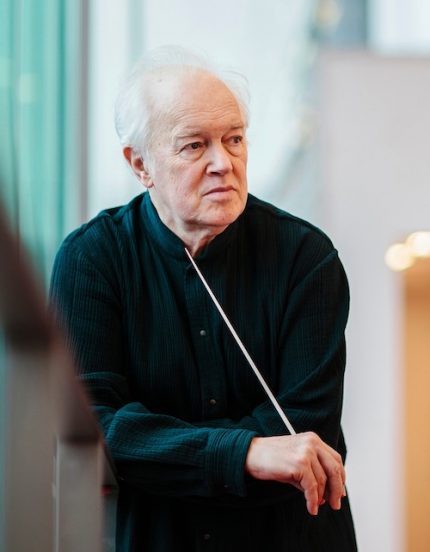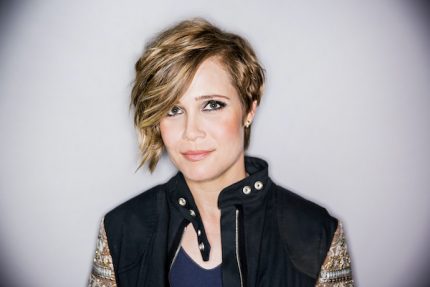CSO closes year in mixed style, going from dull to dramatic with de Waart

The Chicago Symphony Orchestra’s final program of 2019 offered an encyclopedic definition of “mixed” Thursday night. Leading a nicely balanced program of Dvorák, Stravinsky and John Adams, conductor Edo de Waart brought his familiar brand of consummately boring efficiency to the first half. After intermission, the dispirited-sounding musicians seemed to suddenly come to life, even with de Waart’s listless direction. Did they serve some choice holiday punch backstage at the break?
During his eight year-tenure (1977-1985) at the San Francisco Symphony, de Waart was a consistent advocate for the young John Adams, commissioning, performing and recording his music and playing a crucial role in getting Adams’ career launched.
Yet Thursday night’s opening performance of Adams’ The Chairman Dances was so stupefyingly bland and lacking in energy that it’s hard to believe this was the same conductor. As painfully shown in his previous appearances, de Waart has zero chemistry with the CSO musicians. This routine outing of music from Adams’ opera Nixon in China diluted the rock-edged drive of the music, blurred the rhythmic accents and made little out of Adams’ witty hairpin turns and quirky scoring details. It’s no mean feat to make this brilliant music seem dull but de Waart managed. The conductor stolidly directed the music with the kind of tired, dutiful resignation one brings to filling out 1099 forms this time of year.

It’s always a pleasure to have the excellent violinist Leila Josefowicz return to town. But why in the world was she booked to perform Stravinsky’s Violin Concerto—the same piece she played with CSO just six years ago? This is the kind of lazy and/or uninvolved artistic decision-making—like continually reengaging de Waart—that makes CSO’s artistic decisions in the Riccardo Muti era so baffling and enigmatic.
That said, Josefowicz is ideally suited to Stravinsky’s delightful concerto as she proved once again—her ebullient style and slender, astringent tone making the most out of the composer’s wry neo-Baroqueisms and playful rhythmic backflips. The violinist floated the solo of Aria II in refined yet unsentimental fashion and tore through the Capriccio finale like a blazing conflagration, leaving de Waart’s desultory accompaniment in the dust. The kind of crackling support Susanna Malkki provided Josefowicz with six years ago was sorely missed.
The second half was devoted to music of Antonin Dvořák. Imbued with bristling vitality, the Czech composer’s Carnival Overture is about as failsafe as music gets, and, indeed, received a lively outing in stark contrast to the mostly somnolent first half. The performance benefited from typically characterful contributions from clarinetist Stephen Williamson and oboe William Welter. Concertmaster Robert Chen’s glowing violin solo nicely conveyed the moonlit nocturnal essence of the contrasting middle section.
Even with that, the only thing that could raise this evening into the mixed column, was an exciting and involving performance of the final work, Dvořák’s Symphony No. 8. Oddly, that’s exactly what happened.
De Waart remained in his undemonstrative, rehearsal style podium manner, beating time with his head in the score. Yet here the orchestra went from sounding depressed to as if they had received a collective shot of adrenalin. One got the feeling that the Eighth received about 95% of rehearsal time.
Both the dark drama and rustic charm of the Eighth Symphony were manifest throughout. In the opening theme and its reprise the cellos and basses delivered well-blended playing with burnished depth and beauty of tone, and the first movement nicely balanced the drive and bucolic qualities. The Adagio was lyrical and affectionate yet the dark outburst of the middle section had sure impact.
The al fresco charm of the Allegretto was ideally placed with Welter’s oboe solo virtually defining grazioso. Launched with a clarion call by trumpeters Esteban Batallan and John Hagstrom, the finale was as fiery and exciting as one could wish for. With a woodsy solo by Williamson and Emma Gerstein tackling the lightning flute solo in estimable fashion, the performance was rounded off with an exhilarating coda—ending a very mixed evening and the CSO’s troubled year on a positive note.
The program will be repeated 1:30 p.m. Friday, 8 p.m. Saturday and 3 p.m. Sunday. cso.org; 312-294-3000
Posted in Performances


Posted Dec 20, 2019 at 2:40 pm by Brad
I totally agree! I’ve been to some fine Milwaukee Symphony/Edo de Waart concerts in the past, but as you said, he has no chemistry with the CSO for whatever reason. The Orchestra tended to sound sleepy and disengaged. Even the usually rock solid low brass was strangely underpowered for almost the entire evening.
Posted Dec 24, 2019 at 8:55 pm by Thomas Braunreiter
I’ve gone to CSO and Milwaukee Symphony Orchestra concerts for over 40 years, and attended Sunday’s concert. It was not boring. Nor did I find de Wart uninteresting. The audience surely responded well. What does Mr. Johnson want the conductor to do – emote on the podium like Bernstein or Delfts. Perhaps he likes jumping up and down. I watched Solti for years lead with his head in the score. Maybe Mr. Johnson should come to the concert without his mind already made up. The musicians of the MSO considered it an honor to be led by de Wart. It may be time for the trib to get a new reviewer.